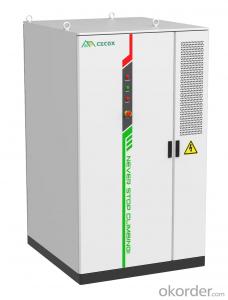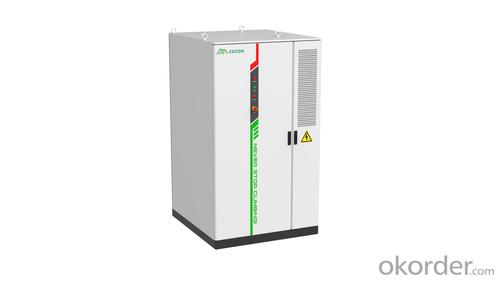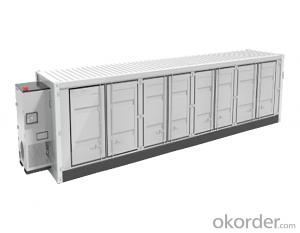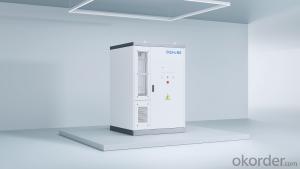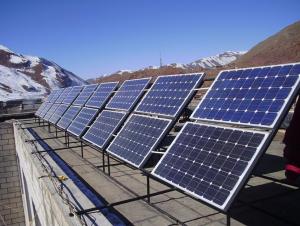Mj Solar Cells 186kw/372kwh 280ah Efficient and Smart Liquid-Cooling Cabinet Commercial/Industrial Storage
- Loading Port:
- SHANGHAI
- Payment Terms:
- TT OR LC
- Min Order Qty:
- 5 unit
- Supply Capability:
- 200 unit/month
OKorder Service Pledge
OKorder Financial Service
You Might Also Like
Specification
Product Features
Ultimate Safety
Multistage variable diameter liquid cooling pipeline, system temperature difference ≤ 4 ℃
Micro channel equalization pipeline, PACK temperature difference ≤ 2.5 ℃
Highly automated ,CCS integrated design
Electrical multidimensional fusion perception 15-year extra long life coolant
Smart and Efficient
BMS active balancing technology improves SOS accuracy by 3% and extends system life by 20%
OTA upgrade is sent from the cloud and upgrade efficiency is improved by more than 90%
Panoramic online monitoring and scheduling
Global customized design and development services
Support virtual power plant interconnection
Flexible and Convenient
Modular design, standardized interface
Elastic expansion, multi machine parallel connection
Multi-sensor and intelligent control system
Triple level modular PCS, up to 99% maximum efficiency
Cloud and edge integrated energy storage intelligent operation and maintenance center
Quick Response
Support multi-device access and multi-user sharing
Millisecond response to power dispatch
100% pre-installed integration
Equipped with LVRT, HVRT functions, and various control modes such as PQ, VF, and networking
Technical Data
Battery Type: LFP-280Ah
System Configuration: 8*1P52S
Rated Charge/Discharge Ratio: ≤0.5P
Rated Capacity:372kWh
DC Rated Voltage:1331.2V
DC Voltage Range:1164.8 ~ 1497.6V
AC Rated Power:186kW
AC Rated Voltage:690V±15%
Rated Grid Frequency:50Hz/60Hz
Size(W*D*H):1329*1447*2300mm
Weight:3.8t
Protection Level:IP54(PACK IP67)
Operating Temperature Range:-30 ~ 55℃
Relative Humidity Range:5% ~ 95%(Non condensation)
Operating Altitude:≤2000m(>2000m Reduction)
Fire Protection System:Aerosol/Perfluoro
Communication Interfaces:CAN/RS485/Ethernet
- Q: What is the impact of temperature fluctuations on solar cell efficiency?
- Temperature fluctuations can have a negative impact on solar cell efficiency. When temperatures increase, solar cell performance can decrease as the excessive heat reduces the electrical output. Conversely, in colder temperatures, solar cell efficiency can improve slightly. However, overall, temperature fluctuations can lead to fluctuations in solar cell output, affecting the overall efficiency and productivity of the system.
- Q: Can solar cells be used to power remote transportation systems?
- Yes, solar cells can be used to power remote transportation systems. Solar cells are a reliable and sustainable source of renewable energy that can be installed on vehicles or infrastructure to provide power for electric motors, batteries, or other components. This allows remote transportation systems such as electric cars, boats, or drones to operate efficiently without relying on fossil fuels or traditional power grids, making them more environmentally friendly and cost-effective in remote areas.
- Q: How do solar cells perform in areas with high levels of air pollution?
- Solar cells perform less efficiently in areas with high levels of air pollution. Air pollution, especially particulate matter and smog, can block sunlight and reduce the amount of light reaching the solar cells. This reduces their ability to generate electricity and can significantly decrease their performance. Additionally, air pollution can settle on the surface of the solar panels, creating a layer of dirt or dust that further reduces their efficiency. Regular cleaning and maintenance are required to ensure optimal performance in such areas.
- Q: Can solar cells be used for powering remote mining operations?
- Yes, solar cells can be used for powering remote mining operations. Solar energy is a reliable and sustainable power source that can be harnessed in remote locations where traditional power infrastructure is unavailable or costly to implement. Solar panels can generate electricity during daylight hours, which can be stored in batteries for use during nighttime or cloudy periods. This makes solar cells a practical and eco-friendly solution for powering remote mining operations, reducing reliance on fossil fuels and minimizing the environmental impact.
- Q: Can solar cells be used for desalination purposes?
- Yes, solar cells can be used for desalination purposes. Solar-powered desalination systems, such as reverse osmosis (RO) or solar stills, can convert saltwater into freshwater by utilizing the energy from sunlight to power the desalination process. This renewable energy source makes desalination more sustainable and environmentally friendly.
- Q: How do solar cells affect the local ecosystem?
- Solar cells have a minimal impact on the local ecosystem. Unlike traditional energy sources, solar cells do not produce harmful emissions or pollution during their operation. Additionally, solar farms can be designed to coexist with the natural environment by incorporating measures like landscaping and wildlife-friendly habitats. Overall, solar cells contribute positively to the local ecosystem by promoting clean energy and reducing carbon emissions.
- Q: What is the efficiency of a solar cell?
- The efficiency of a solar cell refers to the percentage of sunlight it can convert into usable electrical energy.
- Q: Can solar cells be used in indoor applications?
- Yes, solar cells can be used in indoor applications. While they are typically designed for outdoor use to harness sunlight, indoor solar cells can still generate electricity from artificial light sources such as fluorescent or LED lights. However, the efficiency of indoor solar cells is generally lower compared to outdoor usage due to the lower intensity and variability of indoor lighting.
- Q: Can solar cells be used in large-scale power plants?
- Yes, solar cells can be used in large-scale power plants. In fact, many countries are already utilizing solar power plants to generate electricity on a massive scale. These power plants consist of numerous solar panels or arrays that convert sunlight into electricity. With advancements in technology and decreasing costs, solar cells are becoming an increasingly viable option for large-scale power generation.
- Q: How do solar cells perform in polluted environments?
- Solar cells can still generate electricity in polluted environments, but their performance can be negatively affected. Air pollution, such as smog or particulate matter, can block or scatter sunlight, reducing the amount of light that reaches the solar cells and therefore decreasing their efficiency. Additionally, the accumulation of dirt, dust, or pollutants on the surface of the solar panels can further reduce their performance by obstructing sunlight absorption. Therefore, regular cleaning and maintenance of solar panels are essential to optimize their performance in polluted environments.
Send your message to us
Mj Solar Cells 186kw/372kwh 280ah Efficient and Smart Liquid-Cooling Cabinet Commercial/Industrial Storage
- Loading Port:
- SHANGHAI
- Payment Terms:
- TT OR LC
- Min Order Qty:
- 5 unit
- Supply Capability:
- 200 unit/month
OKorder Service Pledge
OKorder Financial Service
Similar products
Hot products
Hot Searches
Related keywords

